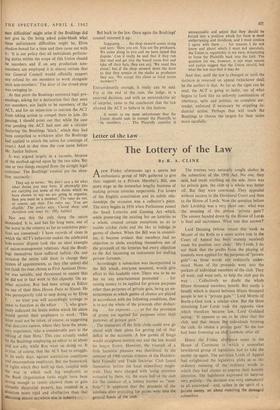Letter of the Law
The Lottery of the Law
By R. A . CLINE AFEW Friday afternoons ago a sparse but • enthusiastic group of MPs gathered to give their support to a Private Member's Bill, one more stage in the somewhat lengthy business of making private lotteries respectable. For lovers of the English constitution and its subtle rela- tionships the occasion was a collector's piece. The story begins in 1956 when Parliament passed the Small Lotteries and Gaming Act which, while preserving the existing bar on lotteries as a whole, created certain exceptions so as (o enable cricket clubs and the like to indulge in games of chance. When the Bill was in commit- tee, it became evident that members had no objection to clubs enriching themselves out of the proceed of the lotteries but every objection to the Act becoming an instrument for making private fortunes.
Accordingly a subsection was incorporated in the Bill which, everyone assumed, would give effect to this laudable view. There was to be no bar on 'any entertainment promoted . . . for raising money to be.applied for private purposes other than purposes of private gain, being an en- tertainment at which games of chance are played in accordance with the following conditions, that is to say the whole of the proceeds after deduct- ing . . . for expenses . . . or for the provision of prizes are applied for purposes other than purposes of private gain.'
The treasurers of the little clubs could now go ahead with their plans for getting rid of that deficit in the accounts. A few games of bingo would straighten matters out and the law would no longer frown. However, the triumph of a little harmless pleasure was shortlived. In the summer of 1960 certain trustees of the Hudders- 'field Friendly and Trade Societies' Club found themselves before the local stipendiary magis- trate, They were charged with 'using premises occupied by them, viz, the main hall of the club for the conduct of a lottery known as "tom- bola." ' It appeared that the proceeds of the tombola after providing for prizes went into the general funds of the club. The trustees very naturally sought shelter in the subsection of the 1956 Act. No one, they said, had made anything on the side, there was no private gain, the club as a whole was better off. But they were convicted. They appealed without success to the Divisional Court and then to the House of Lords. Now the question before their Lordship was a very short one: what was . the meaning of the phrase 'private gain'? The answer handed down by the House of Lords is final and sacrosanct. What was that answer?
Lord Denning (whose return this week as Master of the Rolls to a more active role in the Court of Appeal has been warmly received) made his position very clear: 'My Lords, I do not think that the profits from the playing of tombola were applied for the purposes of "private gain"—as those words are ordinarily under• stood. None of the proceeds went into the pockets of individual members of the club. They all went, and went only, to help the club pay its way. .. . . Collectively no doubt the whole fifteen thousand members benefit. But surely a benefit which is shared between fifteen thousand people is not a "private gain."' Lord Morris of Borth-y-Gest took a similar view. But the three remaining Law Lords took the opposite view • which therefore became law, Lord Goddard saying: 'It appears to me to be clear that the club, and that means the individuals forming the club, do 'obtain a private gain.' So the law had been frowning on club tombola after all.
Hence the Friday afternoon scene in the House of Commons in which a somewhat bewildered group of legislators had to take the matter up again. The patrician Lords of Appeal had enlightened the legislative plebs as to the ordinary meaning of the ordinary words in which they had chosen to express their homely intention. The legislature expressed its surprise very politely—'the decision was very unexpected to all concerned'—and, rather in the spirit of a patient nanny, set about repairing the damaged subsection.


































 Previous page
Previous page